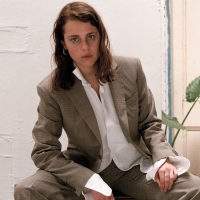 Filthy, Fun & Ferocious: Reclaiming Power with Marika HackmanThe English musician's third album, Any Human Friend, is out now via AMF Records / Caroline Australia.
Filthy, Fun & Ferocious: Reclaiming Power with Marika HackmanThe English musician's third album, Any Human Friend, is out now via AMF Records / Caroline Australia.

Accepting Flaws & Finding Therapy: Inside Montaigne's Complex
On her new album, Montaigne navigates the complexities of growing up - something she's done a lot of since Glorious Heights.
“Like all other human beings, I am deeply flawed.”
It’s a casual Wednesday afternoon when Montaigne (born Jess Cerro) is at a train station, crackling down a phone line about how her new music is meant to free people of shame; shame of flaws, imperfections and non-conformity, to be exact. From this self-reflective moment, it was clear this is an artist who is so in-touch with the world around her and what it means to exist, that there’s no need to be afraid of imperfection. Suddenly it made so much sense why the next step would be to release 13 tracks detailing the ins and outs of a tumultuous (and extremely uncomfortable) period of time that many would push to the side in favour, say, of a love story.
Montaigne’s latest album, Complex, explores some of the darkest moments the 23-year-old has had in recent years: an abusive ex-boyfriend with gaslighting tendencies and a huge, and very literal, Messiah complex; a crippling medical condition that was left undiagnosed before being formally recognised as “burn out;” and very honest commentary on relationships, body image and the world around her. This release, more so than ever, shows Montaigne as an artist – taking honest experience and churning it into glistening songs that explore both the good and bad of humanity. Nothing is too uncomfortable or far-fetched, resulting in an album that’s vulnerable yet veiled with world-class pop production, combining strong bopping melodies with theatrics and expression akin to the greats: Prince and Bowie.
Complex begins with the effervescent CHANGE – a show-tune of sorts that thrives on growth and pulling away from old habits. “Change! To re-arrange my dotty mind,” the chorus sings. “To grow! To do all the things that you won’t.” Straight off the bat, the album taps into a poor experience Cerro had with an ex-partner who, at the time, was emotionally manipulative and extremely gaslighting (see also: track nine, Stockholm Syndrome). A significant portion of the record lays down the complicated relationship shared between the two, followed by what happened post-breakup. The title track, which also happened to be the first song written, was inspired by a message she received from a friend of the ex, after 2016 release, Because I Love You.
“He thanked me for writing the song because it said everything his friends needed to hear and say,” the singer-songwriter said. “He explained that after we broke up, my ex became really religious, started calling himself a prophet, asking his friends to call him a Messiah, and moved to Israel to become a holy man.”
Complex is an album that sees Montaigne walking hand-in-hand with life’s complexities, not only trying to make sense of it all but make peace with it too. In this instance, many feature religious references and nods to the deity-seeking old flame: from the “I’m a dreary, droopy baby, crying out for divinity” of Pleasure, a song that recalls her being at her weakest point physically, to Complex itself saying, “you have the weirdest complex, at least your complex, it helps me write a song, but you’re no God.”
This release isn’t just limited to relationships though; it also sees Cerro battle with herself – something she emphasises she’s still working on. Is this all I am good for?, the track she’s “most proud of,” is a war in itself. The sparse, synthy number starts off with “every day I wake up and measure the skin around my waist, is this all I am good for,” and progresses into a world of body image issues, childhood expectations and comparisons to others (including Nick Cave, surprisingly). Then there’s Losing My Mind, a song written “at the apex of my health issues,” where she found herself trying to make music in the basement of Thomas Rawle but unable to sit up. “The illness was invisible,” she explained. “I could say I was exhausted in a way you couldn’t believe but even my parents doubted me.” It was a while before doctors, specialists and Montaigne herself understood this condition was medically recognised “burn out.” Also scattered throughout is lead single For Your Love, the anthemic READY, and latest pre-release offering, Love Might Be Found (Volcano) – all various shades of confession, resilience and sheer brilliance. Complex isn’t one thing because humanity isn’t one thing.
Here, Montaigne explains the journey she’s taking to better herself and how she hopes listeners get therapy from her new record, Complex.

Who or what is “complex” in this album?
I guess me, and everyone else in the world. Part of Complex is acknowledging that we’re all complex and intricate, psychologically, which is something I’m speaking about a lot in the record, in regard to my own interpretation of it. Like all other human beings, I am deeply flawed, and I very much wanted to understand how to... well, why. I just wanted to be free of [those flaws]; I’ve realised now [how] to manage the things that go on in your head and remove the internalised shame, that I think a lot of us are taught to feel.
How much did song-writing and creating this album help you in releasing this shame?
I think a lot, and I think in a more meaningful way than I can consciously understand… There are some studies that show that writing about traumatic experiences and the darker experiences of our lives actually help people’s mental health, and physical health and everything else. I think there’s a lot of that going on during song-writing, and the thing is I journal every day as well, and I go to therapy regularly, and all efforts are sort of compounding to help me come to terms with everything and re-write the program, or [at least] dissect the program and be able to put it all back together.
You know, [with Alcoholics Anonymous], the whole thing is the first step to recovery is being aware that you need to recover. I think that’s where I’m at. And where I was at, and where I’m going to continue to be at - I’m not fixed! I’m not done! No one is done. I just have the tools now to be able to keep doing the work and not drown. I think, also, what I did drop off from writing in the record was shame: shame in myself and the way I saw and thought about myself and other people. Now I have more compassion for myself, and I’m kinder to myself; I’m more of a friend to myself. That makes it easier.
With all those methods for self-improvement, it really seems like you’re in this state of just actively wanting to grow. What do you think has changed between where you are now, and where you were a few years ago when you released Glorious Heights?
I’m 23 now and back then I was 18 or 19, and when I think any 18 or 19-year-old – no matter how precocious you are – you’re still a baby in a sense. You haven’t had experiences. I mean I’m still super-duper young and there are so many experiences I haven’t had, which will make me even more emotionally intelligent down the track and wiser in certain ways that I can’t access now, by virtue of not having had that experience on this Earth. But when you’re 18 to 19, every minute that passes is you growing in a certain direction. The direction one grows might be more regressive, but it’s still momentum and something, and that’s what’s different. There’s this passage though time, time changes things, and what changed was: who I am, what I like, the boundaries I have for myself, the music I like to make, the music I listen to, my knowledge of that music and the world in general; and that skill-set [for myself] has grown or not grown or whatever, you know, just time has happened and what I’ve done with time.

Last time I saw you perform was at the Factory Theatre in Sydney, a few months ago. I noticed you were wearing a headset to sing into while you danced, and it seemed so freeing. Were you thinking about performance and movement on-stage when you were creating Complex?
I feel like my live performance and what happens in the studio are very different processes. I don’t even think about how I’m going to play the songs live because if I did, I don’t think I’d write half the songs I write because they’re so hard to sing live and moving while singing is difficult. I don’t really think about it, what happens just happens. I’m a fairly physical person, I play a lot of sport, I always have, and I love dancing in the way that I do - I can’t really help it. Also, any person who has anxious energy inside them, a lot of the time, that manifests physically. When I get on stage, I do it in a really big way.
What do you hope people take away from Complex?
Therapy. I hope they get therapy. I really fear being a public person, I really fear it. I’ve been thinking about this a lot, and it scares the shit out of me, but I want to do it because I know that I have something to say that I really care about and that I think I can say in a really effective way. To me, it’s several things, not just one chorus: I think I’m not afraid to be vulnerable in public, and I’m not afraid to show who I really am, warts and all. I think it’s really important for young people to see someone who is successful and creative, who is still anxious and has gone through a lot of shit and isn’t afraid to be flawed in public. I think that’s really important for young people today, especially with social media and all of us having to perform and put masks on all the time.
Obviously I want to make music for the rest of my life and [social media] comes with it, like you’re not going to be able to do that financially and have the support, I need to be successful publicly, but what actually keeps me going is the fact I can talk about environmental conservation and protection, and climate change, and mental illness amongst young people and queer people, especially, and society, and all the stuff that I’ve gone through that I know a lot of people have trouble with because society isn’t set up in a way that makes it easier to mentally and psychologically survive in.
When I write a record, I want to write about these things; what I want people to take from it is I, as a pop artist, am saying that it’s not a shameful thing to have been abused or to have made a mistake. It’s just life, and life is always going to be hard, but I think it’s the song-writing itself that is a coping strategy for these things. I hope to show people, with the way I comport myself in public, that art and working and being open and having conversations that are raw and hard with a friend or loved ones is how to do it. It’s not about consumption and whether or not you’re popular or cool, or what you’re wearing, or what kind of music you listen to, if it’s cool enough or not. To me it’s like no, it’s not about that shit, that shit’s empty; it’s about so much more.
Montaigne's new album, Complex, is out August 30th via Wonderlick/Sony Music Australia. Catch her on tour this November.
Follow Montaigne: FACEBOOK
 Filthy, Fun & Ferocious: Reclaiming Power with Marika HackmanThe English musician's third album, Any Human Friend, is out now via AMF Records / Caroline Australia.
Filthy, Fun & Ferocious: Reclaiming Power with Marika HackmanThe English musician's third album, Any Human Friend, is out now via AMF Records / Caroline Australia.
 Mallrat is growing up – and becoming a pop star of the futureOn her third EP Driving Music, Mallrat looks within and opens up about who she – Grace Shaw – really is.
Mallrat is growing up – and becoming a pop star of the futureOn her third EP Driving Music, Mallrat looks within and opens up about who she – Grace Shaw – really is.